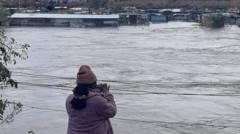### South Africa, once a leader in medical research, has seen its reputation tarnished by substantial budget cuts from the U.S., jeopardizing public health efforts globally and the interests of pharmaceutical companies.
# The Impact of U.S. Budget Cuts on South Africa’s Medical Research Landscape

# The Impact of U.S. Budget Cuts on South Africa’s Medical Research Landscape
### Budget reductions from the Trump administration threaten South Africa's vital medical research capabilities and global health advancements.
In a striking turn of events, South Africa's role as a leading medical research hub faces critical challenges due to significant budget cuts under the Trump administration. Centers that previously thrived with bustling researchers are now eerily quiet, their hallways filled with abandoned office furniture and documents from steeped projects.
Once celebrated for its substantial contributions to global health, particularly in combating H.I.V., heart disease, and respiratory illnesses like Covid-19, South Africa's esteemed research centers are grappling with a harsh reality. With a collaborative spirit and reliance on resources from the U.S., South African scientists have made essential strides in medical breakthroughs. Unfortunately, recent executive orders and budget constraints have crippled this dynamic ecosystem apenas months.
Dr. Harold Varmus, a Nobel Prize-winning professor of medicine, emphasized this attrition, asserting that South Africa served as a “beacon” in global health research. The ongoing plight has far-reaching consequences not only for South African communities but also for pharmaceutical giants like Merck, Gilead Sciences, and Pfizer, which heavily depend on this research infrastructure for the development and testing of drugs and vaccines.
As budget constraints lead to layoffs and the cutting of significant research initiatives, researchers and students in cities like Cape Town, Johannesburg, and Durban are confronted with the grim task of dismantling their dreams alongside their research projects, underscoring a profound loss not just limited to South Africa, but extending to global public health aspirations.



















